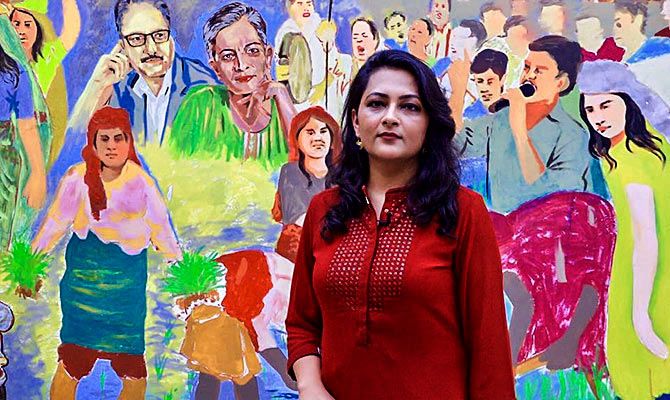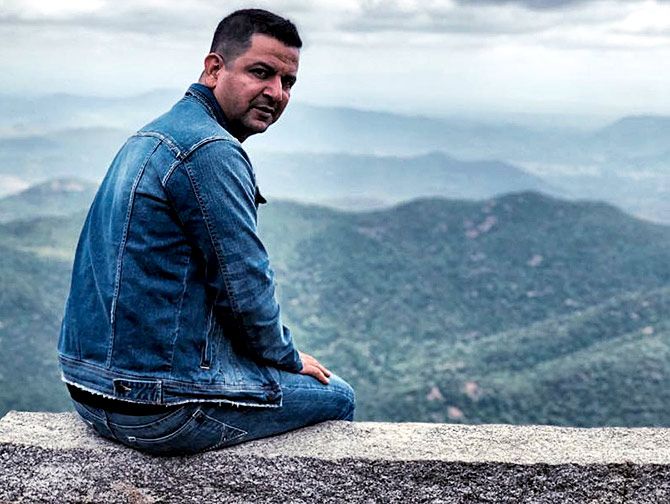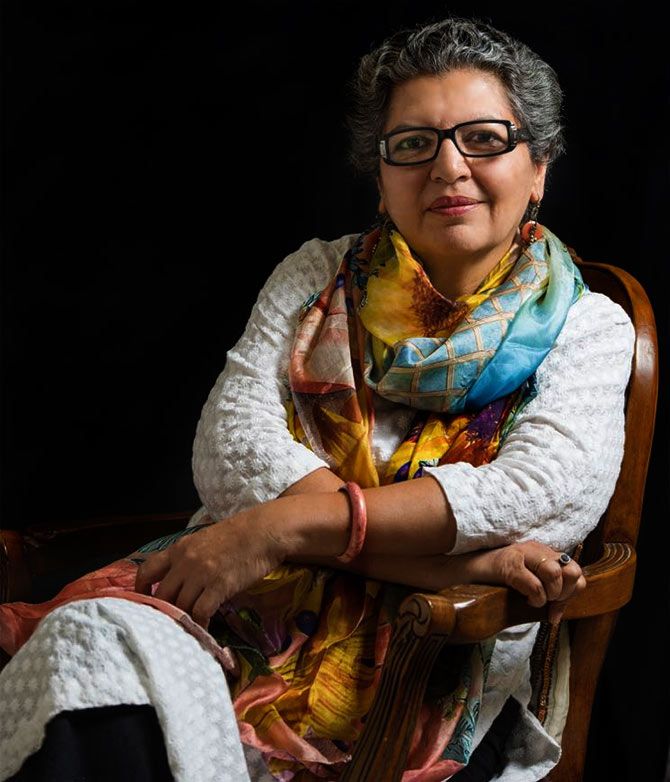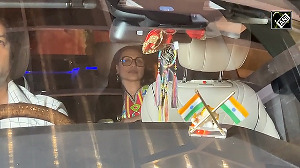'The Quran says that saving one life is like saving humanity. So by donating for Kerala, you are following what Allah told you.'
'This gesture would create goodwill for Muslims and work as a counter to the hostility they face.'
Jyoti Punwani reports how some Muslims won't sacrifice goats this Bakri Eid, instead donating the money towards relief efforts in Kerala.
Two of them have always performed the ritual sacrifice for Bakri Eid. The third stopped doing so 15 years ago.
But this year, these three Muslims will observe Bakri Eid differently.
Arfa Khanum Sherwani, senior editor at The Wire, has donated half her salary to Kerala's Chief Minister's Relief Fund in lieu of the ritual sacrifice on Bakri Eid that has been her practice till today.
Talha bin Mohsin, advertising executive, will do what he always has done: The regular qurbani. This time, though, he has chosen to curtail its scale so that he can donate for Kerala's flood-affected.
Rana Safvi, Delhi historian and founder of shair#, a Twitter forum on Urdu poetry, has kept aside one-third of the money she always spends on charity on Bakri Eid, for Kerala. The other 2/3rds will go to two different charities.
The suggestions of these three Muslims on social media to make the Kerala floods, not animal sacrifice, the focus of this Eid, has drawn praise from some and flak from many of their own community.
The main allegation being made against them is that they are 'RSS agents'. But Arfa Khanum has had an additional barb thrown at her: A 'bepurdah' woman like her anyway can't know anything about Islam.
How about sacrificing her expenses on make-up and sending that amount to Kerala, she has been asked.

"I didn't think the attacks would get so personal," Arfa tells Rediff.com, "but I can understand where they are coming from. As it is Muslims are worried about the aftermath of the qurbani -- will they be able to carry the meat safely home? -- and here I'm saying 'Don't even do the qurbani."
So why did she suggest this?
"I saw the pictures of the floods, and thought here's my community busy buying animals for sacrifice. What if the money spent on this was to be diverted to those desperately in need in Kerala?"
"It would send a great message of empathy at a time when everyone is trying to tear us apart and tell us that we are either Hindu or Muslim. This would show that we think like Indians," Arfa explains.
"These days there is so much talk about the North-South divide. So many Muslims live in the North. Somebody in Lucknow thinking of the flood victims in Kochi -- that would be a thread that would unify in so many ways," she adds.
"This gesture would create goodwill for Muslims, who are being derided today as 'beef eaters' and what have you. It would work as a counter to the hostility they face, and could defeat the politics of polarisation."
To some extent, this did happen: Arfa's suggestion was welcomed by Hindus too, including those who had often criticised her for her anti-BJP views. Their appreciation might appear to validate the views of those Muslims who are accusing her of trying to flow with the 'naya mausam', of trying to 'build bridges' with the ruling party.
But Arfa disagrees with this interpretation. "I feel there's a grey area between those who are absolute bhakts and those who are absolutely anti-BJP. That's the section one must reach out to."
But neither the praise of this 'grey section' nor the condemnation of many in her community, made her rethink her suggestion. What was more important to her was that at last count, about 70 Muslims had declared that they would follow her example this Bakri Eid.
What of her immediate family? Arfa's husband agrees with her, but her mother kept silent when Arfa informed her that for the first time this Bakri Eid, she would not be sacrificing a goat.
"We are a large family and our father brought us up to follow our heart. So while some of us may perform the qurbani, others may not. I think it's very good to have a sense of democracy within your family," she says.

Talha bin Mohsin's suggestion made on his Facebook page was different from Arfa's. Do both, he said, if you can afford to: Perform the qurbani and also donate for Kerala's flood-affected.
Buy a cheaper goat, take a smaller share if it is a joint qurbani, and use the money saved for Kerala.
When he told his father he wanted to scale down his qurbani this year so that he could donate for the Kerala floods, his father supported him. So did many of his friends, some of whom are five-time namazis.
Mohsin has always lived in Delhi's Jamia Nagar and is a product of Jamia Milia Islamia right from nursery up to graduation.
Describing himself as a "proud practising Muslim", Mohsin is somewhat amused at those accusing him of knowing nothing about Islam. "I probably know more about Islam than these trolls."
Islam is not just about qurbani, says Mohsin. It is also about saving lives.
"The Quran says that saving one life is like saving humanity. So by donating for Kerala, you are following what Allah told you. A good Muslim has to care about others."
It was just a coincidence, says Mohsin, that he linked the Kerala disaster with Bakri Eid. "There is nothing anti-religion in what I suggested. It was because Bakri Eid was round the corner, and everyone was buying animals that I said what I did. Otherwise I would have said buy a cheaper T shirt or forego a movie to donate for Kerala."
In fact, inspired by his suggestion, a Hindu from Maharashtra suggested that instead of hiring a music system for the coming Ganpati festival, Hindus should donate that amount to Kerala.
"I wanted to inspire people's imagination. I didn't spell out any directives," says Mohsin.

For Rana Safvi, this year, only the recipient of her donation was different. She stopped doing the qurbani in 2001 and has since been donating the amount that would have been spent to an orphanage.
"My husband and I decided on this after finding that the qurbani wasn't achieving what it was meant to," explains Rana.
"Bakri Eid is about the spirit of charity. You must donate one-third of the meat to the poor, one-third to family and friends, and keep only one-third for yourself. But we found that neither the poor we were distributing it to, nor friends, wanted it because they had already received enough from others."
Donating the amount that would have been spent on the qurbani to an orphanage ensured that the poor were fed in a more sustained way, over a month.
Besides, says Rana, sacrificing an animal was a Sunnat, something practised by the Prophet, whose example should be followed, but it was not a farz or duty.
For those doing the Haj, it is a duty. But when she undertook the pilgrimage in 2005, Rana chose the option of donating money to an agency that makes sure that an animal is sacrificed in an abattoir and the meat sent to the poor.
"The Prophet Ibrahim's story in the Quran (he dreamt that Allah had asked him to sacrifice his only son, and just as he was going to do so, Allah, pleased with his obedience, substituted his son with a ram) is primarily about submission to Allah," says Rana.
Rana is dismissive of those who have criticised her decision. "This is between me and God. Who are these people? What can they do to me? We can't live our lives by what people think. Ultimately I've to face God and answer him."
Like Rana, there are Muslims across the country who have quietly stopped doing the qurbani and spend the money on education.
Professor Farrukh Waris, former principal of Mumbai's Burhani College, had seen her father do the same half a century ago in Lucknow and Allahabad.
This year, she will donate Rs 76,000, the price of four goats, to pay a student's college fees. "I have always been saying that our community can use the qurbani money for community welfare," says the professor.
"Islam is one faith where your intent or neeyat is given maximum weightage. If your neeyat is to give something in the path of God, then sacrifice money for charity instead of sacrificing living things," Professor Waris adds.
In Bengaluru, a group of 25 Muslims who have been quietly spreading this message for the last decade are steadily getting support.
The leader of the group who did not want to be named fearing an orthodox backlash would undo their efforts told Rediff how they had managed to convince even the elderly in their families to donate instead of sacrifice an animal.
"We explain to them that Hazrat Ibrahim's was a pastoral society and sacrificing an animal was appropriate as animals were storehouses of value. People ate their meat, used their milk, tanned their skins for water bags and tents, rode on their backs and exchanged them in bazaars." So the tradition continued for thousands of years.
"The Prophet Mohammed continued the practice as the context had not changed," he explains.
"But today, money is the most prized possession for everyone. Sacrificing money for education for the poor or for their daily needs is more valuable."
This man narrates an interesting anecdote. He had broached this sensitive topic to an 80-year-old academic and told him that he had given up animal sacrifice eight years earlier.
To his surprise, the old man shook his hands and said, "If you won't tell my wife, let me share the secret that I have not been doing sacrifice for the last 40 years. I tell my wife I'm sending money to sacrifice a goat in my village. But I am actually funding the studies of rural youth and have produced 16 graduates."











 © 2025
© 2025